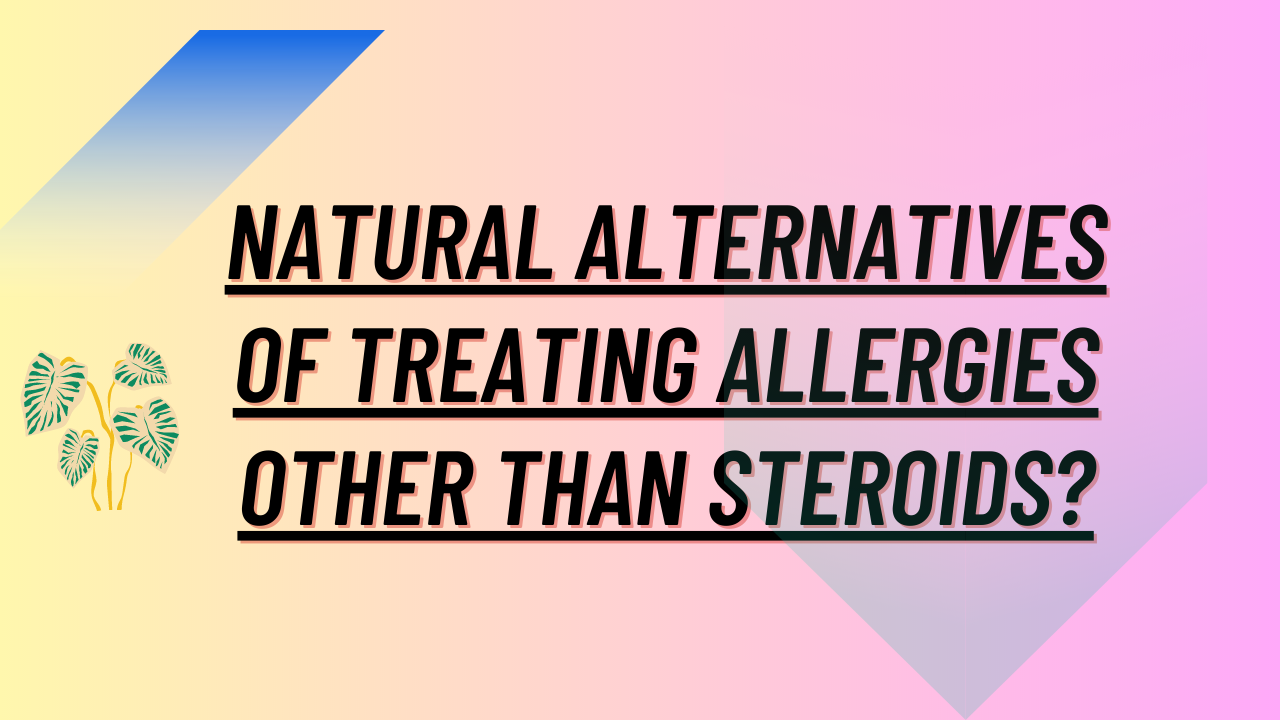Allergies are a common health issue affecting millions of people worldwide. It can range from mild symptoms such as sneezing, runny nose, and itchy eyes to severe reactions like anaphylaxis. Allergic reactions occur when the immune system overreacts to foreign substances like pollen, animal dander, or certain foods. While steroids are commonly used to treat allergies, many people prefer to avoid them due to their potential side effects. But, are there any natural alternatives of treating allergies other than steroids?
Introduction
This article will discuss some natural remedies for treating allergies. While these remedies may not work for everyone, they are worth considering for those who want to avoid steroids or reduce their dependence on medication.
The Role of Steroids in Allergy Treatment
Steroids, also known as corticosteroids, are a class of drugs that suppress the immune system's response to inflammation. They are commonly used to treat allergies, especially when symptoms are severe or not responding to other treatments. However, steroids have potential side effects such as weight gain, mood changes, and increased risk of infections.
Natural Alternatives of Treating Allergies
1. Saline Nasal Irrigation
Saline nasal irrigation involves flushing out the nasal passages with a saltwater solution. This method can help to reduce nasal congestion, remove allergens, and thin out mucus. Saline nasal irrigation is easy to do and can be done with a neti pot, squeeze bottle, or nasal spray.
2. Probiotics
Probiotics are live microorganisms that are beneficial for health, particularly for the digestive and immune systems. Studies have shown that probiotics can help to alleviate symptoms of allergies and improve the body's immune response. Probiotics are available in supplement form or can be found in foods like yogurt, kefir, and sauerkraut.
3. Quercetin
Quercetin is a flavonoid found in many fruits, vegetables, and herbs. It has antioxidant and anti-inflammatory properties that can help to reduce the severity of allergic reactions. Quercetin can be taken in supplement form or consumed through foods like apples, onions, and green tea.
4. Vitamin C
Vitamin C is an antioxidant that helps to strengthen the immune system and reduce inflammation. It can also act as a natural antihistamine, which makes it beneficial for treating allergies. Vitamin C can be taken in supplement form or consumed through foods like citrus fruits, strawberries, and bell peppers.
5. Essential Oils
Essential oils are concentrated extracts from plants that are used for their therapeutic properties. Some essential oils, such as peppermint, lavender, and eucalyptus, can help to relieve symptoms of allergies like nasal congestion and respiratory problems.
FAQs -
Can natural remedies completely replace steroid treatment for allergies?
Natural remedies may work for some people, but they may not be effective for everyone. It's important to consult with a healthcare professional to determine the best course of treatment.
Are there any side effects of natural remedies for allergies?
While natural remedies are generally considered safe, some people may experience side effects such as gastrointestinal upset or allergic reactions. It's important to use them as directed and consult with a healthcare professional if you have any concerns.
Can probiotics help with food allergies?
While probiotics may help to improve the immune system's response to allergens, they are not a substitute for avoiding food allergens. People with food allergies should continue to avoid allergenic foods and carry appropriate medications with them at all times.
Is it safe to use essential oils for allergies?
Essential oils should be used with caution, as they can be potent and may cause allergic reactions in some people. It's important to dilute them properly and avoid applying them directly to the skin. Essential oils should also be avoided in people with respiratory conditions like asthma.
How long does it take for natural remedies to start working for allergies?
The effectiveness of natural remedies may vary depending on the individual and the severity of their symptoms. Some remedies may provide immediate relief, while others may take several days or weeks to take effect. It's important to use them consistently and monitor your symptoms closely.
Conclusion
While steroids are a common treatment for allergies, natural remedies may provide an alternative for those who want to avoid their potential side effects or reduce their dependence on medication. Saline nasal irrigation, probiotics, quercetin, vitamin C, and essential oils are just a few of the natural remedies that can help to alleviate allergy symptoms. However, it's important to consult with a healthcare professional before trying any new treatment, including natural remedies.
So, if you're looking for natural alternatives of treating allergies other than steroids, there are various options available to explore. It's important to do your research, speak to your healthcare provider, and find a treatment plan that works for you.
Read this बादाम खाने के फायदे । badam khane ke faede
Read this- क्या है सांडे के तेल का रहस्य । sande ke tel ka rahasya
Read this - बादाम खाने के फायदे । badam khane ke faede
Read this -Vegetarian Diet for Weight Loss
Read this -Howdo I get refund for online e-learning course?
Read this-Should You Cut Your Hair to Shoulder Length?
Read this-Latest veggie noodle trends anddishes
Read this-Effective Liver Cleansing Drinks
Read this-10 best wishes for holi 2023 in hindi ! होली की शुभकामनाएं 2023
Read this-Who is Hindenburg Research ?
Read this-How to Use Hashtags to Make YourContent Go Viral
Read this-Earn money through chatgpt 2023
Read this-Depression: Understanding AvailableTreatments and Medications
Read this-Depression: Understanding theSymptoms and Seeking Help
Read this-Early Detection of Cancer Symptoms: What You Need to Know
Popular on the Internet -
Thank you for taking the time to read my blog at trendingtelegram.blogspot.in. I hope you found the information helpful and informative. Your support and interest in my content are greatly appreciated. If you have any feedback or questions, please feel free to reach out. I look forward to connecting with you and sharing more valuable insights in the future.





No comments:
Post a Comment